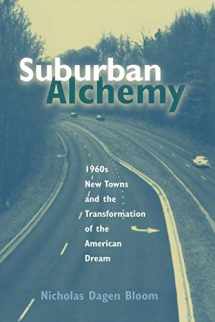
Suburban Alchemy: 1960s New Towns and the Transformation of the American Dream (Urban Life and Urban Landscape Series (Cloth))
Book details
Summary
Description
In Suburban Alchemy: 1960s New Towns and the Transformation of the American Dream, Nicholas Dagen Bloom examines the "new town" movement of the 1960s, which sought to transform the physical and social environments of American suburbs. Idealistic developers across America offered bold, large-scale projects as comprehensive solutions to chaotic suburban sprawl. Bloom offers case studies of three of the movement's more famous examples-Reston, Virginia; Columbia, Maryland; and Irvine, California-to flesh out his historical account. In each case, innovative planners mixed land uses and housing types; refined architectural, graphic, and landscape design; offered well-defined village and town centers; and pioneered institutional planning. As Bloom demonstrates, these efforts did not uniformly succeed, and attempts to reshape community life through design notably faltered. However, despite frequent disappointments and compromises, the residents have kept the new-town ideals alive for over four decades and produced a vital form of suburban community that is far more complicated and interesting than the early vision promoted by the town planners. Lively chapters illustrate efforts in local politics, civic spirit, social and racial integration, feminist innovations, and cultural sponsorship. Suburban Alchemy should be of interest to scholars of U.S. urban history, planning history, and community development, as well as the general reader interested in the development of alternative communities in the United States. Nicholas Bloom was educated at the University of Wisconsin and Brandeis University. He lives in New Orleans and teaches at Tulane University.


We would LOVE it if you could help us and other readers by reviewing the book
Book review



